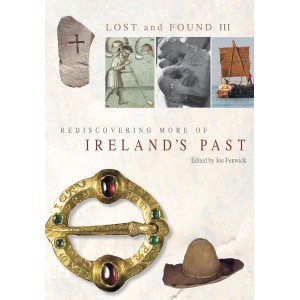The number three has a pleasing symmetry. This is the third volume in the Lost and found series, and the concluding one. It has come full circle. Indeed, one of the essays in the first book, which provided the eponymous title of the series, was to lead to an interesting discovery in its own right, the curious tale of which concludes this final volume. It is also interesting to note that Professor Etienne Rynne, in his Foreword to Vol. 2, requested that he write the first essay in the next volume, having written the concluding essay in the first. Sadly, he was lost to the archaeological world in the summer of 2012 before he could fulfil his wish, but his indomitable spirit can be found in the opening essay of this volume, as is entirely appropriate. These two essays, therefore, neatly book-end this third volume and seem to suggest that this is the proper place to conclude the series—and so it does.
The first rule of this volume, the authors were informed, is that there are no rules. Each was simply asked to write on the subject of ‘discovery’, however they chose to define it. They were asked to adopt an easily accessible style and avoid the constraints of academic convention (the formal language, the obscure jargon and the over-zealous use of citation and footnote) though a brief bibliography of further reading was encouraged. In order to point people in the right direction, a brief ‘style-sheet’ was produced, which (of course) was roundly ignored by everyone who took the first rule to heart. Based on the previous experience of Vols 1 and 2, I had expected variety, novelty and creativity, but I had not anticipated the total anarchy in terms of content, style and format that was to come my way for the third. I wrestled valiantly with the first few essays in a vain attempt to enforce the ‘style-sheet’, pleading with authors to see sense, but I was simply overwhelmed by successive waves of uncompromising obstinacy and an almost universal tendency to adopt a ‘freestyle’ format until a point was reached where I had to concede defeat. I was both outnumbered and outgunned. It was far better, as I was soon to discover, to relax, ‘go with the flow’ and trust the individual author’s instincts. And who was I, as a humble field archaeologist, to argue? Each essay, after all, is written by an eminent scholar or recognised expert in his or her own field. The content can be trusted to be genuine, well informed and factual. I’ll confess, however, that the format and style of the book diverges somewhat from the norm, but I am all the more grateful to everyone for that. The result is a wonderfully unruly anthology of essays, a wildly exhilarating theme-park of novelty and wonder. It is a book for the fearless, thrill-seeking reader—a rollercoaster ride through the fairgrounds of archaeology, Celtic studies, Classical studies, geology, geophysics, history, Irish studies, musicology and more.
Lost and found III: rediscovering more of Ireland’s past
- ISBN: 978-1-9997909-3-6
- Availability: In Stock
-
€30.00
Tags: Lost and Found

